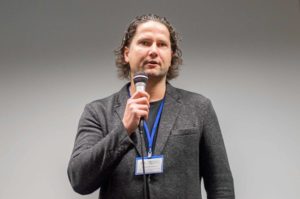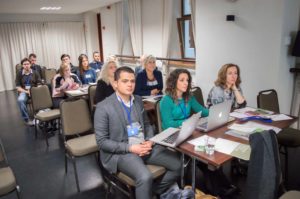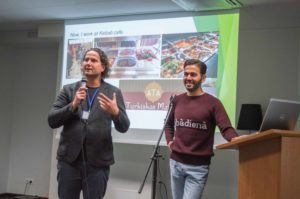Dec 6, 2017 | News
Prof. Mirko D. Garasic, UNESCO Chair Research Scholar, published in AJOB Neuroscience:
Why HEAVEN Is Not About Saving Lives at All
“Life extension is one of the main goals of Posthumanism and—though camouflaged as a therapeutic operation—HEAVEN could be the Trojan horse through which it would become acceptable to keep on “staying alive” by changing bodies to our heads (assuming, for the sake of argument, that our identity resides only in the latter). This overlooked scenario makes the operation even more controversial.”
In line with one of the areas of interest of the UNESCO Chair Neurobioethics and the Neurobioethics Reserach Group, led by UNESCO Chair fellow Fr. Alberto Carrara, L.C., Prof. Garasic’s article focuses on some of the key features of the Posthuman ideology in relation to life extension “through all the available biotechnologies [which] would include becoming stronger, becoming smarter, and, of course, living longer— or forever.”
The UNESCO Chair first concern is to cooperate towards the realization of workshops and publications regarding contemporary debates on Transhumanism, Posthumanism, Neurobioethics, Neuroscience, Human Rights, and Bioethics. The Chair persists with its experience in fostering the art of convergence and cooperation in global ethics gathering scholars and experts to promote dialogue and the dissemination of bioethical principles. Click on the link to read about Prof. Mirko Garasic participation to the workshop Ethics and Technology: Some Issues held in Hamburg on November the 15th.
Oct 26, 2017 | Uncategorized
 On the 11th of November, two collaborators of the UNESCO Chair, Ing. Kevin Ramirez and Serena Montefusco participated to the third EUROSOL event in Vilnius, Lithuania. Vilnius Business College, one of the seven partners of EUROSOL project co-funded by the European Union, organized a conference, Active Society – Innovative Solutions (ASIS-2017) with the aim of raising awareness on migration and increasing solidarity among European citizens. During the entire day, several topics based on migration, integration, and migrants’ rights were presented. For example, Dr. Stefanos Spaneas of University of Nicosia, Cyprus, gave a speech on European regulations and laws from an historical perspective. It was interesting to see how European law is developing to ameliorate the situation of migrants and refugees; however, as Dr. Spaneas argued, the asylum and migration policy is still far to be implemented in favor of a regular and legal migration. Then Dr. Stefanos Spaneas left the podium to another EURSOL partner, Nathan James Ward of Diagrama Foundation, UK, who shared his idea of migration compared to English birds’ migration with the colleagues of Vilnius.
On the 11th of November, two collaborators of the UNESCO Chair, Ing. Kevin Ramirez and Serena Montefusco participated to the third EUROSOL event in Vilnius, Lithuania. Vilnius Business College, one of the seven partners of EUROSOL project co-funded by the European Union, organized a conference, Active Society – Innovative Solutions (ASIS-2017) with the aim of raising awareness on migration and increasing solidarity among European citizens. During the entire day, several topics based on migration, integration, and migrants’ rights were presented. For example, Dr. Stefanos Spaneas of University of Nicosia, Cyprus, gave a speech on European regulations and laws from an historical perspective. It was interesting to see how European law is developing to ameliorate the situation of migrants and refugees; however, as Dr. Spaneas argued, the asylum and migration policy is still far to be implemented in favor of a regular and legal migration. Then Dr. Stefanos Spaneas left the podium to another EURSOL partner, Nathan James Ward of Diagrama Foundation, UK, who shared his idea of migration compared to English birds’ migration with the colleagues of Vilnius.
 Moving on, the Associate Professor, Dr. Thomas Butvilas of the Vilnius Business College, Vilnius, introduced his topic on children who are left behind. He stressed the importance of assisting and supporting children during stressful and painful moments that may occur in their lives. Cases of abandonment and physical or psychological violence, are typical of unaccompanied migrant minors. These minors are usually sent or sold by their parents to leave their country of origin to have a better future. However, reality does not always meet the expectations. The intentions might be good, but the acts leave a lot of wounds.
Moving on, the Associate Professor, Dr. Thomas Butvilas of the Vilnius Business College, Vilnius, introduced his topic on children who are left behind. He stressed the importance of assisting and supporting children during stressful and painful moments that may occur in their lives. Cases of abandonment and physical or psychological violence, are typical of unaccompanied migrant minors. These minors are usually sent or sold by their parents to leave their country of origin to have a better future. However, reality does not always meet the expectations. The intentions might be good, but the acts leave a lot of wounds.
The second part of the morning session was more focused on social inclusion and innovative actions. For example, Egle Dosiene presented an NGO, Blessed Jurgis Matulatis Social Center. She explained the social activities, most of them cleaning activities, that she and a group of young people lead in a neighborhood of Vilnius, in order to have an active population and more sensitive to the migration issue. Moreover, Vaidesvarans Sundars of School of Business Administration Turiba, Latvia, presented the program Erasmus Plus to show how diversity is important in an educational environment.
 After a typical Lithuanian lunch at Amberton Hotel, the discussion continued focusing on labor market and its challenges. Kristina Kovaite, for instance, started by pointing out that often migrants are seen as the ones who steal jobs in the host countries. She offered an alternative vision arguing that labor market will change because of the Industry 4.0. In other words, she claimed that artificial intelligence will be the real threat.
After a typical Lithuanian lunch at Amberton Hotel, the discussion continued focusing on labor market and its challenges. Kristina Kovaite, for instance, started by pointing out that often migrants are seen as the ones who steal jobs in the host countries. She offered an alternative vision arguing that labor market will change because of the Industry 4.0. In other words, she claimed that artificial intelligence will be the real threat.
 The panel discussion ended with two testimonies of two young men, Nanko Nikolai Todorov from Bulgaria, and, Elvin Jafarov from Azerbaijan, who shared their successful lives in Vilnius. Mr. Todorov owns his company of children’s clothing and Mr. Jafarov has his own Kebab and cafeteria. Gathering speakers and participants from fourteen countries, it was possible to have a diverse discussion and dialogue on EU integration and migrants’ rights. The UNESCO Chair being present to this discussion continues to pursue its mission of cooperation and global ethics increasing its sense of dialogue and investigation on human rights, multiculturalism, interreligious dialogue, and technology. Moreover, the UNESCO Chair representatives had the possibility to share with the other partners the program of their EUROSOL event that will be held on 27th of November in Rome.
The panel discussion ended with two testimonies of two young men, Nanko Nikolai Todorov from Bulgaria, and, Elvin Jafarov from Azerbaijan, who shared their successful lives in Vilnius. Mr. Todorov owns his company of children’s clothing and Mr. Jafarov has his own Kebab and cafeteria. Gathering speakers and participants from fourteen countries, it was possible to have a diverse discussion and dialogue on EU integration and migrants’ rights. The UNESCO Chair being present to this discussion continues to pursue its mission of cooperation and global ethics increasing its sense of dialogue and investigation on human rights, multiculturalism, interreligious dialogue, and technology. Moreover, the UNESCO Chair representatives had the possibility to share with the other partners the program of their EUROSOL event that will be held on 27th of November in Rome.
Sep 23, 2017 | News
Beauty, Living Beings and People: A Look from Bioethics, Aesthetics, Technoscience and Biolaw
The UNESCO Chair will host a cultural and academic encounter on the “Beauty, Living Beings and People: A Look from Bioethics, Aesthetics, Technoscience and Biolaw” in Madrid from November 27th to December 2nd.
The scheduled meetings of this event will shape the investigation and work of the International Network of Bioethics, Aesthetics, Technoscience, and Biolaw. Members of the International Research Group Bioethics and Aesthetics will review the chapters of the book project written in collaboration with the UMNG on “Global Bioethics Genomics and Human Improvement in the 21st Century.” Researchers will also discuss the participation into the Summer Course that will offer the Pontifical Athenaeum Regina Apostolorum of Rome, on “Human Enhancement: Bioethical Challenges of Emerging Technologies” that will take place on July 2018, under the direction of the Chairholder of the UNESCO Chair in Bioethics and Human Rights, Prof. Alberto García.
Among the participants in the program, Prof. Alberto García, will talk about the “Challenges of Global Bioethics, Beauty, Aesthetics, Justice and Human Rights.” On the other hand, Dr. Amparo de Jesús Zárate Cuello (Universidad Militar de Nueva Granada) will speak about “Challenges of Bioethics for the Baby Design in Relation to the Assisted Human Fertilization.”
This event is one of the fruitful initiatives of our “Bioethics Global Art” endeavor, intending to bridge art and bioethics by studying the relation and interaction between bioethics and art and the impact of art in human behavior, evaluate the impact of the transformative power of arts in research and medical ethics as well as in environmental ethics and bridging the gap between academics involved and working in bioethics and the art world by carrying research activities and publications.
Read the full program
Sep 13, 2017 | News
Springer Press has published a new book: Religious Perspectives on Bioethics and Human Rights
Editors: Joseph Tham, Kai Man Kwan, Alberto Garcia
The new volume is a product of the third international “Bioethics, Multiculturalism and Religion” workshop that was held in Hong Kong in 2013 to discuss the question of relationship between universal rights and cultural diversity.
Fr. Joseph Tham, Fellow of the UNESCO Chair, was coordinator of this event held at the Hong Kong Baptist University.
Religious Perspectives on Bioethics and Human Rights intents to investigate the delicate issue of human rights in different cultures and religions. Experts from Christianity, Judaism, Islam, Buddhism, Daoism, Hinduism and Confucianism discuss the tension between their religious traditions and the claim of universality of human rights. Among the participants were collaborators of the UNESCO Chair in Bioethics and Human Rights, including chairholder Alberto Garcia who is also co-editor of this book.
In this work, certain writers find the human rights language too individualistic and it is foreign to major religions where the self does not exist in isolation, but is normally immersed in a web of relations and duties towards family, friends, religion community, and society.
One of the main topics discussed in the book regards how the human rights discourse is predominantly Western liberal ideal, which in bioethics is translated to mean autonomy and free choice making the East-West contrast particularly evident. In today’s democratic societies, laws have been drafted to protect individuals and communities against slavery, discrimination, torture or genocide. However, it is not clear to what extent universal rights supersede respect for cultural diversity and pluralism.
In accordance with one of the areas of interest of the UNESCO Chair, Bioethics, Multiculturalism and Religion, the collection of articles inside Religious Perspectives on Bioethics and Human Rights book, demonstrates a rich selection of positions among different religions, as they confront the ever more pressing issues of bioethics and human rights in the modern world.
The UNESCO Chair first concern is to promote and protect the common human rights of all issues. Cooperating in the realization of workshops and publications regarding contemporary debates on religious ethics, human rights, bioethics, cultural diversity and multiculturalism, the Chair persists with its experience in fostering the art of convergence and cooperation in global ethics gathering scholars and experts to promote dialogue and the dissemination of bioethical principles.
Go to Publications and Resources and click on the link Springer.it to buy a copy of the book.
Jul 19, 2017 | News
On July 7th 2017, Prof. Mirko D. Garasic participated in a stimulating international conference in Turin on genome editing, reproductive technologies, science fiction and media. The conference was organized by Dr. Solveig Lena Hansen and Dr. Maurizio Balistreri with the generous support of the Andrea Von Braun Stiftung.
The aim of this conference was to create a debate “on assisted reproduction and embryo research [that] are being revived through genome editing, artificial gametes, and mitochondrial donation. These technologies initiate discussions that involve the scientists themselves. […] In this debate, the technological promises are balanced against risks for future generations; which resembles similar patterns of arguments that were triggered after earlier inventions. Science fiction never stopped bringing individual and collective issues of these technologies to the public.”
Prof. Mirko D. Garasic gave his contribution with a talk entitled “The Evolution of Physical Enhancement in Cinematography” divulgating the ideas expressed in the recent published article in Studia Bioethica. In this article, he analyzes “the ways in which Physical Enhancement (PE) made its first cinematic appearance and then make comparisons with more recent filmic re-elaborations on the theme [offering] direct insights of some re-adaptations of the same film (Robocop) and saga (Star Trek), and take into account stories, mostly comic-based, that only recently arrived on the big screen, but that nonetheless followed a pre-existing narrative giving relevance to PE (Spider-Man, Captain America, X-Men).” The article can be read here.
Since 2009, one of Chair’s chief areas of interest has been Neurobioethics. The Chair is thus deeply concerned with the ethical issues inherent to progress in basic and clinical applications of neuroscience. The Chair’s experience in fostering the art of convergence and cooperation in global ethics enables her to gather diverse groups of international professionals and researchers from various specialties adopting an interdisciplinary approach on the ethics of neuroscience and the neuroscience of ethics.

 On the 11
On the 11 Moving on, the Associate Professor, Dr. Thomas Butvilas of the Vilnius Business College, Vilnius, introduced his topic on children who are left behind. He stressed the importance of assisting and supporting children during stressful and painful moments that may occur in their lives. Cases of abandonment and physical or psychological violence, are typical of unaccompanied migrant minors. These minors are usually sent or sold by their parents to leave their country of origin to have a better future. However, reality does not always meet the expectations. The intentions might be good, but the acts leave a lot of wounds.
Moving on, the Associate Professor, Dr. Thomas Butvilas of the Vilnius Business College, Vilnius, introduced his topic on children who are left behind. He stressed the importance of assisting and supporting children during stressful and painful moments that may occur in their lives. Cases of abandonment and physical or psychological violence, are typical of unaccompanied migrant minors. These minors are usually sent or sold by their parents to leave their country of origin to have a better future. However, reality does not always meet the expectations. The intentions might be good, but the acts leave a lot of wounds. After a typical Lithuanian lunch at Amberton Hotel, the discussion continued focusing on labor market and its challenges. Kristina Kovaite, for instance, started by pointing out that often migrants are seen as the ones who steal jobs in the host countries. She offered an alternative vision arguing that labor market will change because of the Industry 4.0. In other words, she claimed that artificial intelligence will be the real threat.
After a typical Lithuanian lunch at Amberton Hotel, the discussion continued focusing on labor market and its challenges. Kristina Kovaite, for instance, started by pointing out that often migrants are seen as the ones who steal jobs in the host countries. She offered an alternative vision arguing that labor market will change because of the Industry 4.0. In other words, she claimed that artificial intelligence will be the real threat. The panel discussion ended with two testimonies of two young men, Nanko Nikolai Todorov from Bulgaria, and, Elvin Jafarov from Azerbaijan, who shared their successful lives in Vilnius. Mr. Todorov owns his company of children’s clothing and Mr. Jafarov has his own Kebab and cafeteria. Gathering speakers and participants from fourteen countries, it was possible to have a diverse discussion and dialogue on EU integration and migrants’ rights. The UNESCO Chair being present to this discussion continues to pursue its
The panel discussion ended with two testimonies of two young men, Nanko Nikolai Todorov from Bulgaria, and, Elvin Jafarov from Azerbaijan, who shared their successful lives in Vilnius. Mr. Todorov owns his company of children’s clothing and Mr. Jafarov has his own Kebab and cafeteria. Gathering speakers and participants from fourteen countries, it was possible to have a diverse discussion and dialogue on EU integration and migrants’ rights. The UNESCO Chair being present to this discussion continues to pursue its